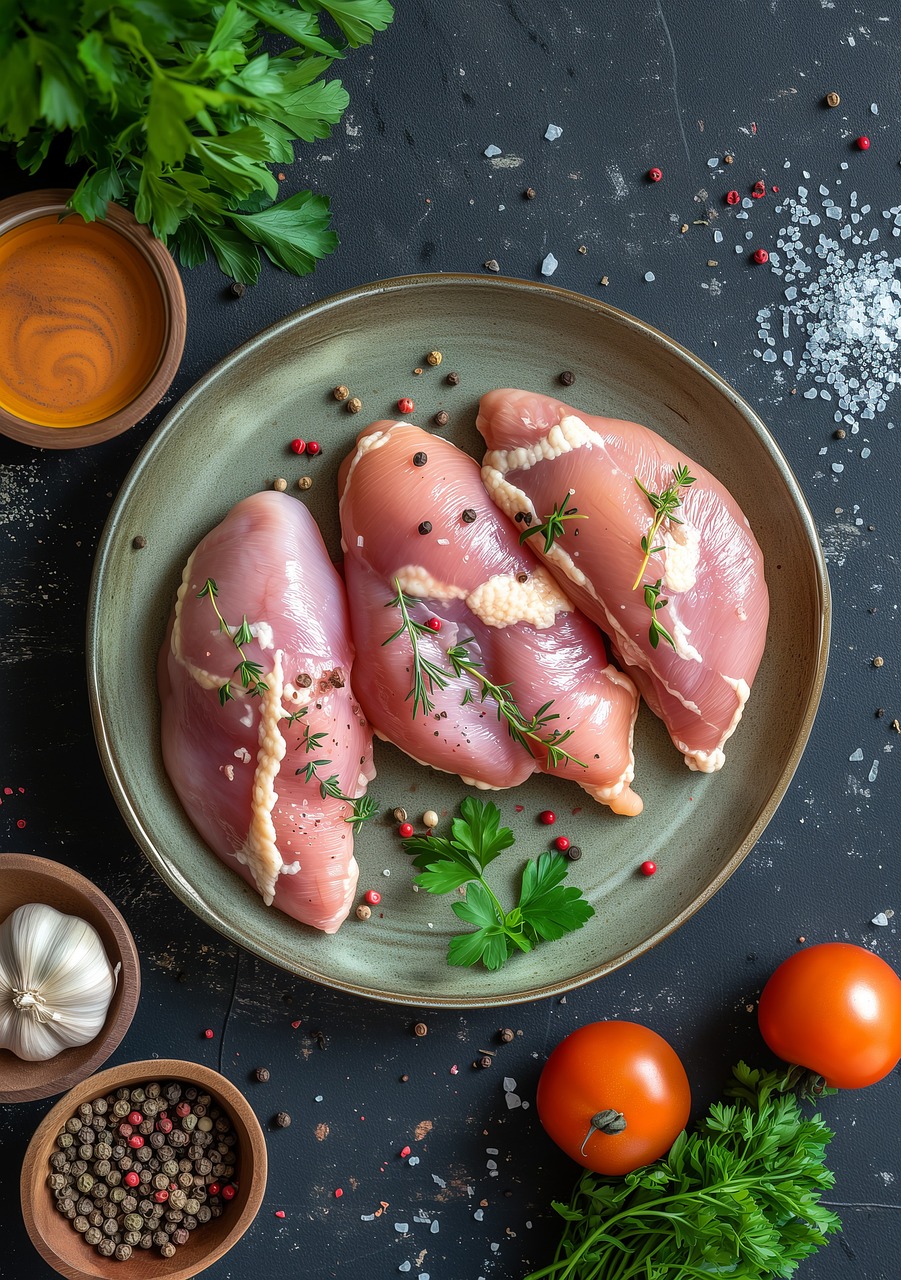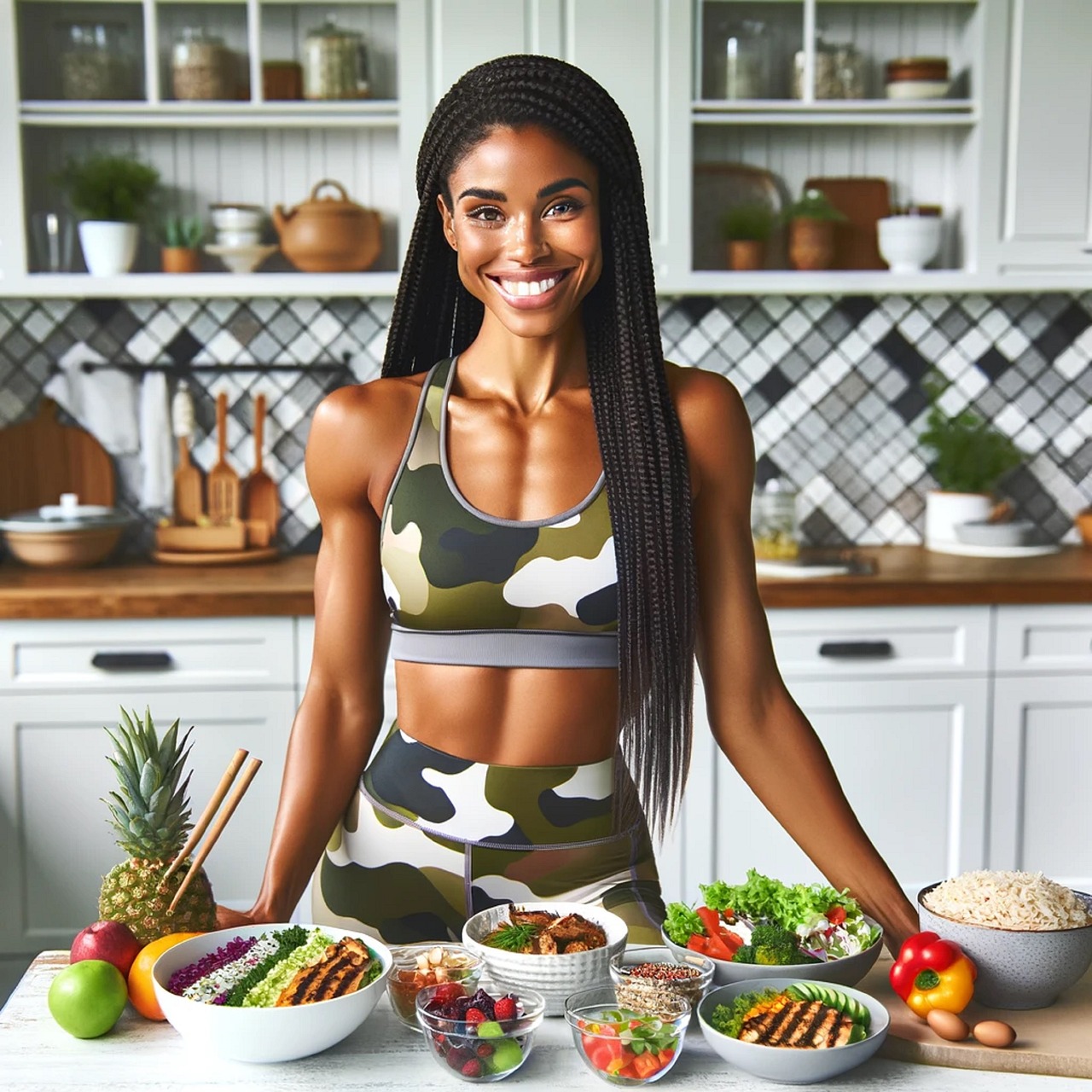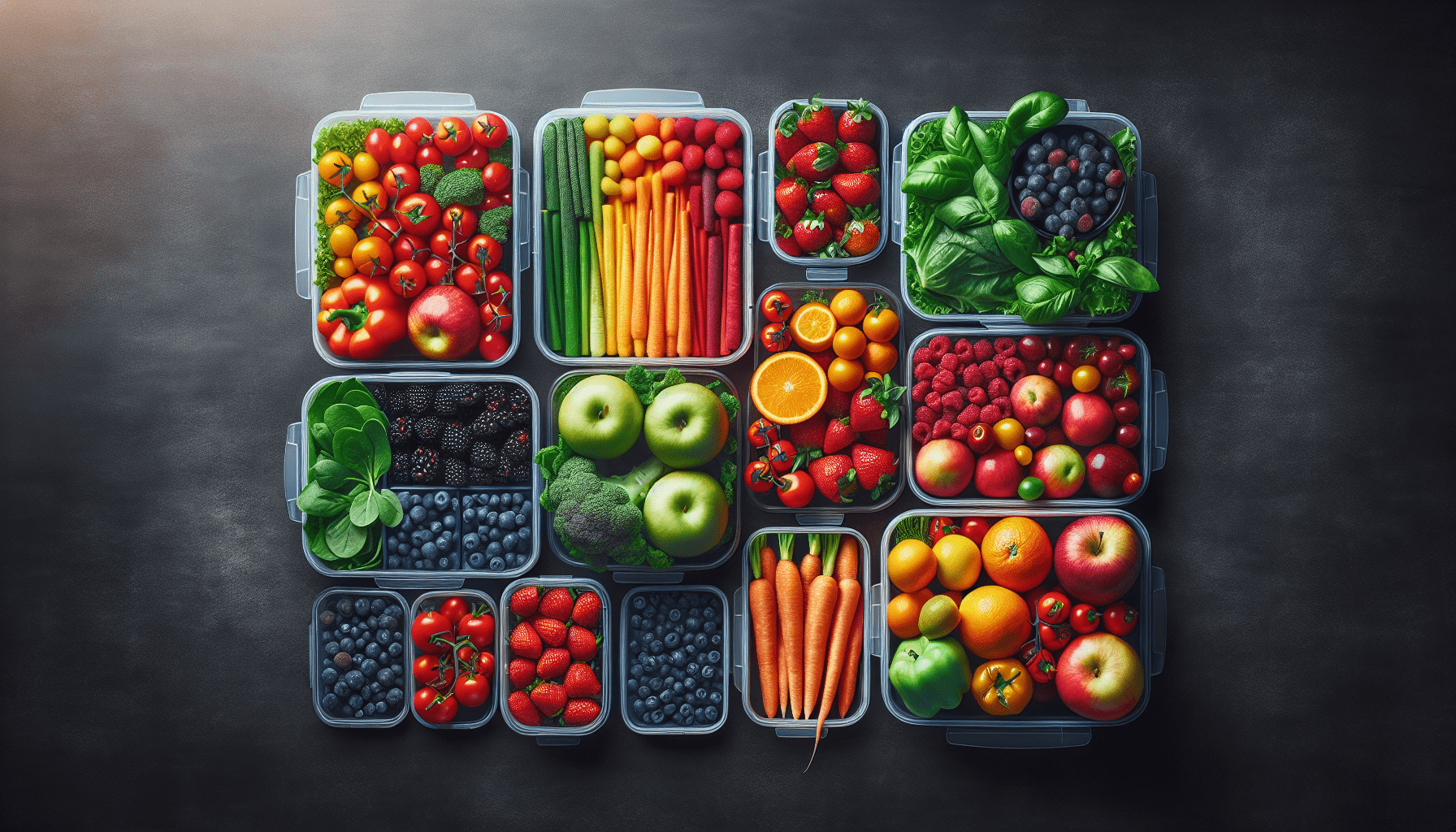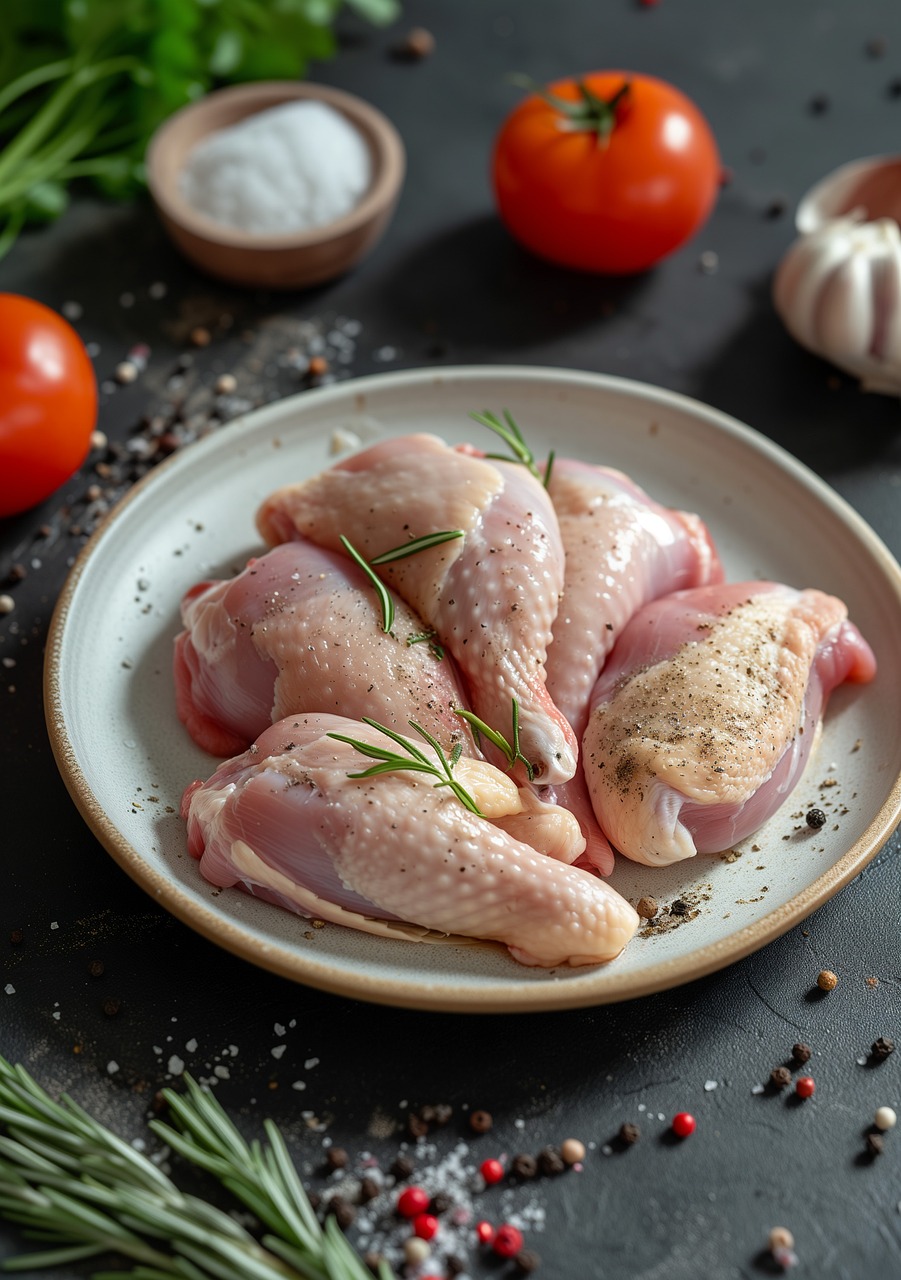Have you ever struggled with maintaining a healthy diet while trying to lose weight? If so, you’re not alone. Many people find it difficult to plan and prepare nutritious meals that support their weight loss goals. However, there’s good news – by mastering the art of healthy meal prep, you can take control of your eating habits and set yourself up for success. In this article, we’ll explore the benefits of meal prep for weight loss and provide you with practical tips and strategies to get started. Remember, it’s always essential to consult a health professional before making any changes to your diet or exercise routine.
Discover the Ultimate Weight Loss Secrets Here!
Benefits of Meal Prep
Save Time
Meal prepping can save you a significant amount of time in your busy schedule. By dedicating a few hours on the weekend to prepare your meals for the upcoming week, you can save precious time during weekdays when you’re often rushed. Instead of spending time each day on meal planning, grocery shopping, and cooking, you can simply grab a pre-prepared meal from your fridge and go. This leaves you with more time for other activities you enjoy.
Save Money
Meal prepping can also help you save money. By planning and preparing your meals in advance, you can avoid impulse purchases and unnecessary trips to restaurants or take-out places. Buying ingredients in bulk and utilizing leftovers can significantly reduce your grocery bill. Additionally, by having all your meals planned out, you won’t be tempted to order expensive and unhealthy fast food or eat out regularly.
Control Portion Sizes
One of the biggest challenges in maintaining a healthy diet is portion control. When you meal prep, you have the opportunity to portion out your meals in advance, ensuring that you’re eating the right amount of food. By controlling portion sizes, you can avoid overeating and make it easier to manage calorie intake. This is especially beneficial for those who are trying to lose weight or maintain a healthy weight.
Choosing the Right Foods
Include a Variety of Nutrient-Dense Foods
When meal prepping for weight loss, it’s essential to include a variety of nutrient-dense foods. Aim to incorporate foods from all food groups to ensure you’re getting a diverse range of vitamins, minerals, and other essential nutrients. Include lean protein sources, such as chicken, turkey, fish, tofu, or legumes, whole grains like quinoa or brown rice, plenty of fruits and vegetables, and healthy fats like avocados or nuts.
Focus on Lean Protein
Protein is an important component of a weight loss meal plan as it helps you feel fuller for longer and supports muscle growth and repair. When meal prepping, prioritize lean protein sources such as chicken breast, turkey, fish, tofu, or beans. These options are lower in calories and saturated fat compared to fatty cuts of meat. Remember to vary your protein sources throughout the week to keep meals interesting.
Incorporate Whole Grains
Whole grains are a fantastic addition to a weight loss meal. They are rich in fiber, which can help you feel full and satisfied. Include options like quinoa, brown rice, whole-wheat pasta, or whole-grain bread in your meal preps. These wholesome choices provide a steady release of energy and have more nutritional value compared to refined grains.
Add Plenty of Fruits and Vegetables
Fruits and vegetables are packed with essential vitamins, minerals, and antioxidants while being low in calories. When meal prepping, fill your containers with a variety of colorful fruits and veggies. They can be enjoyed as snacks, added to salads or stir-fries, or even blended into smoothies. Including a wide range of produce not only adds flavor and texture to your meals but also provides nutritional benefits.
Choose Healthy Fats
While it’s important to limit your intake of unhealthy fats, it’s equally important to include healthy fats in your meal preps. Options like avocados, nuts, seeds, olive oil, and fatty fish like salmon or tuna are excellent sources of healthy fats. These fats provide essential fatty acids, promote satiety, and help absorb fat-soluble vitamins.

Click Here for Proven Fat-Burning Strategies!
Meal Prep Equipment and Containers
Invest in Good Quality Containers
Investing in good quality containers is key when it comes to meal prepping. Look for containers that are durable, leak-proof, and BPA-free. Opt for containers with compartments or dividers to keep different components of your meal separate, ensuring that your food stays fresh and flavors don’t mix. Glass containers are a great option as they are microwave-safe, easy to clean, and don’t retain odors.
Get Essential Kitchen Tools
Having the right kitchen tools can make your meal prepping experience more efficient and enjoyable. Some essential tools include a sharp chef’s knife, cutting boards, measuring cups and spoons, mixing bowls, vegetable peeler, and a food scale. These tools will help you efficiently prep ingredients, measure portion sizes accurately, and create delicious meals.
Consider Meal Prep Bags or Insulated Containers
Meal prep bags or insulated containers are great for those who need to take their meals on the go. These bags or containers help maintain the temperature of your meals, keeping them fresh and safe to eat throughout the day. Look for options that have separate compartments for ice packs, utensils, and additional snacks. They are a convenient and eco-friendly way to transport your meals without the need for disposable containers.
Meal Planning and Prep Tips
Set Realistic Goals
When starting your meal prepping journey, it’s essential to set realistic goals. Start with small steps and gradually increase the number of meals you prep each week. This will prevent overwhelm and make the process more sustainable in the long run. Remember, the goal is to make meal prepping a habit that fits into your lifestyle, rather than a short-term solution.
Create a Weekly Meal Plan
Creating a weekly meal plan is the foundation of successful meal prepping. Take some time each week to plan out your meals and snacks. Consider your schedule, dietary preferences, and nutritional needs. Choose a variety of recipes that you enjoy and that meet your weight loss goals. Having a detailed plan will make the grocery shopping and prep process more efficient.
Make a Shopping List
Once you have your meal plan, create a shopping list based on the ingredients you need. Stick to the list while grocery shopping to avoid impulse purchases and ensure that you have everything you need. Planning your meals in advance and having a shopping list helps you stay organized and saves time at the store.
Prep Ingredients in Advance
Prepping ingredients in advance can drastically reduce your cooking time during the week. Wash, chop, and portion out vegetables, cook grains or proteins, and store them in separate containers. This way, when it’s time to cook, you’ll have all the ingredients ready to go, streamlining the process and making it easier to stick to your meal plan.
Cook in Batches
Cooking in batches is a time-saving technique that helps ensure you always have a healthy meal within reach. Choose recipes that can be easily doubled or tripled and cook larger portions. Once cooked, divide the meals into individual portions and refrigerate or freeze them for future consumption. This way, you’ll have ready-made meals for those busier days when you don’t have time to cook.
Batch Freezing for Convenience
Batch freezing is a useful technique for preserving the freshness and quality of your meals. It allows you to have a variety of meals readily available without worrying about spoilage. Portion out your cooked meals into freezer-safe containers or bags, making sure to label them with the contents and date. Freezing meals also provides the opportunity to vary your options throughout the week.
Label and Date Your Meals
Labeling and dating your meals is crucial to keep track of their freshness and ensure they are consumed within the recommended time frame. Use labels or tape to mark the contents of each container and the date it was prepared. This will help you easily identify and rotate your meals, preventing any waste or confusion.
Unlock Your Path to a Healthier You!
Meal Prep Recipes and Ideas
Protein-Packed Breakfast Bowls
Protein-packed breakfast bowls are a convenient and nutritious way to start your day. Prepare a large batch of overnight oats, chia pudding, or Greek yogurt and portion them into individual containers. Top them with fruits, nuts, and seeds for added flavor and texture. These breakfast bowls can be customized to your taste preferences and can be enjoyed on the go.
Mason Jar Salads
Mason jar salads are a creative way to meal prep refreshing and satisfying lunches. Layer your favorite salad ingredients, starting with dressing at the bottom, followed by sturdier vegetables, proteins, and finally, leafy greens. When it’s time to eat, simply shake the jar to distribute the dressing and enjoy a fresh and crisp salad.
Sheet Pan Dinners
Sheet pan dinners are a time-saving option for those busy weeknights. Simply line a sheet pan with foil or parchment paper, toss your protein of choice (such as chicken, fish, or tofu) with vegetables and seasoning, and roast everything in the oven. This method allows you to cook a complete meal in one pan, minimizing clean-up and maximizing flavor.
Slow Cooker or Instant Pot Meals
Slow cooker or Instant Pot meals are perfect for those who prefer a hands-off approach to cooking. Place your ingredients in the appliance, set the timer, and let it do the work for you. From soups and stews to chili and shredded meats, a wide variety of delicious and healthy meals can be prepared with minimal effort.
Freezer-Friendly Soups and Stews
Soups and stews are excellent options for meal prepping, as they often taste even better after being stored in the fridge or freezer. Make a large batch of your favorite soup or stew and portion it out into individual freezer-safe containers. When you’re ready to enjoy a comforting meal, simply thaw, heat, and savor the flavors.
Portion Control and Mindful Eating
Use Measuring Tools
When it comes to portion control, using measuring tools can be incredibly helpful. Invest in measuring cups, spoons, and a food scale to accurately measure your ingredients and servings. This will ensure that you’re consuming the right portions and prevent unintentional calorie overload.
Focus on Eating Mindfully
Meal prepping provides a great opportunity to practice mindful eating. Take the time to savor each bite, paying attention to the flavors, textures, and aromas. Avoid distractions like TV or scrolling through your phone while eating. Eating mindfully helps you tune in to your body’s hunger and fullness cues, leading to better portion control and overall satisfaction.
Practice Portion Control
Portion control is essential for weight loss and weight maintenance. When meal prepping, portion out your meals into individual containers according to your specific dietary needs and goals. This will help you avoid overeating and allow you to stay on track with your weight loss journey.

Storing and Reheating Meals
Proper Storage Techniques
To keep your prepped meals fresh and safe to eat, it’s important to follow proper storage techniques. Allow your meals to cool down to room temperature before refrigerating or freezing them. Store them in airtight containers to prevent spoilage and contamination. Make sure your fridge is set at the appropriate temperature (below 40°F or 4°C) to maintain the quality of your meals.
Reheating Tips
When reheating your prepped meals, it’s important to reheat them to a safe internal temperature to prevent foodborne illnesses. Use a food thermometer to ensure your food reaches at least 165°F (74°C) before consumption. Reheating methods can vary depending on the meal, but options like microwave, stovetop, or oven can be used. Follow the specific instructions for each meal to maintain its taste and texture.
Additional Tips for Success
Experiment with Spices and Herbs
One way to keep your meals exciting and flavorful is to experiment with a variety of spices and herbs. Enhance the taste of your meals with different combinations of seasonings, such as garlic, cumin, paprika, turmeric, or fresh herbs like basil, cilantro, or rosemary. This will add depth and complexity to your dishes without the need for excess salt, sugar, or unhealthy sauces.
Prep for Snacks and Treats
Don’t forget to include prepped snacks and treats in your meal planning. Having healthy snacks like cut-up vegetables, fruit, or homemade energy balls readily available will keep you satisfied between meals and prevent unhealthy snacking. Additionally, prepping desserts or healthier treats can satisfy your sweet cravings while still adhering to your weight loss goals.
Stay Hydrated
Staying hydrated is essential for overall health and weight loss. Make sure to include water as part of your meal prepping routine. Carry a water bottle with you throughout the day and drink water regularly. You can also infuse water with fruits, herbs, or citrus slices for added flavor. Adequate hydration will keep you energized, promote digestion, and aid in weight loss.
Stay Consistent
Consistency is key when it comes to successful meal prepping for weight loss. Set aside dedicated time each week for planning, shopping, and prepping. Make it a priority to stick to your meal plan and enjoy the meals you’ve prepared. Consistency will help you establish healthy habits and make meal prepping an integrated part of your lifestyle.
Seek Professional Guidance
Before making any significant changes to your diet or exercise routine, it’s always a good idea to consult a health professional. They can provide personalized advice, help you set realistic goals, and ensure that your meal prepping approach aligns with your specific needs and medical conditions. Your health professional can be an invaluable resource on your weight loss journey.

Conclusion
Meal prepping is an effective and practical strategy for weight loss. It saves time, money, and helps you maintain portion control. By choosing nutrient-dense foods, investing in quality containers, and following proper meal planning and prep tips, you can successfully navigate the art of healthy meal prep. Remember to stay consistent, practice portion control, and prioritize mindful eating. And most importantly, consult a health professional to ensure your weight loss journey is safe and effective. Happy meal prepping!

